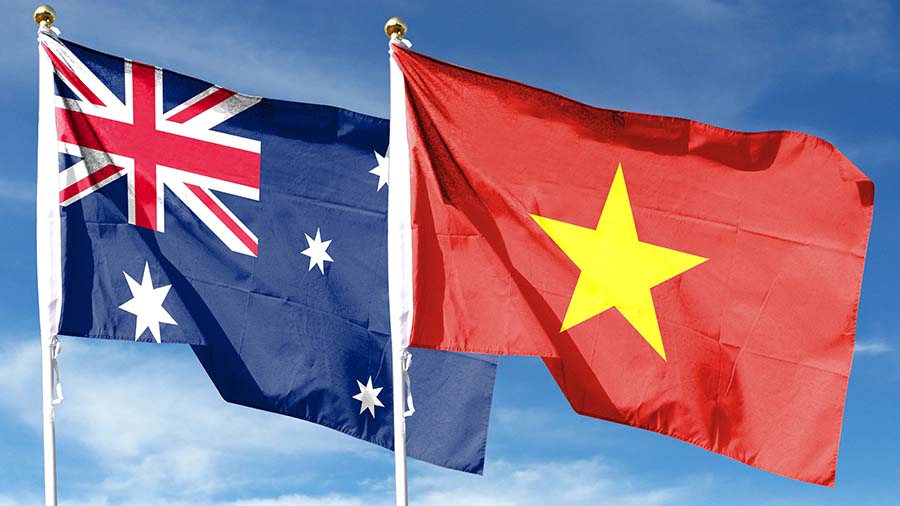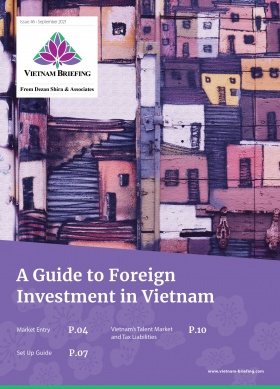Mergers and Acquisitions in Vietnam: Domestic Players Lead Trends
- Despite the pandemic, Mergers and Acquisitions (M&A) activity in Vietnam rebounded in 2021, being driven by domestic companies.
- Investors remain confident in Vietnam, paving the way for strong M&A activity for this year as well as 2022.
- While challenges remain, such as border closures and the pandemic, Vietnam’s strong market fundamentals will likely ensure it remains an attractive M&A market.
Mergers and Acquisitions (M&A) provides a solution to several obstacles foreign investors face when they want to enter Vietnam’s market. During the pandemic, many partnerships were formed through M&As with domestic companies taking initiative in the market.
M&A activities were disrupted in 2020 by the COVID-19 pandemic, with total value dropping by 50 percent to about US$3.9 billion. However, in the first nine months of the year, M&A deals with total disclosed value have already totaled US$3 billion as per White & Case.
Upon facing economic and social challenges due to COVID-19, many businesses have identified M&A as an optimal solution to restructure, expand their ecosystems, and create value chains.
In the last six months of 2019 and 2020, the market witnessed notable acquisitions or restructuring of private corporations. The pandemic has resulted in a shift in the market trend towards more acquisitions than mergers.
Accordingly, from 2019 to 2021, more than 80 percent were purchases of shares for takeover and 9 percent were joint ventures while only 11 percent of M&A deals were mergers.
Key industries expected to grow strongly
According to a 2021 report by White & Case, the top three sectors by most deals for M&A activity were industrials and chemicals, consumer goods, and real estate. The industrial and chemicals sector generated a total of seven deals during the first three quarters of 2021. In the real estate market, M&A remains the quickest solution for foreign developers to enter the country and for local developers to expand their land portfolio.
As for the housing real estate market, in 2021 there is a trend of developers seeking land funds via M&A deals in the suburban districts of Hanoi and Ho Chi Minh City. Neighboring provinces with good connections to Ho Chi Minh City, such as Binh Duong and Dong Nai, still have land to develop urban areas and megacities that can become the focus of the M&A market. Such provinces have been attracting investors from Japan, Singapore, and South Korea.
According to a survey by the CMAC Institute, industries expected to have the most active M&A activities in the coming years include consumer goods manufacturing, industry (energy), real estate, retail, ICT, and logistics.
Manufacturing, one of the sectors significantly impacted by COVID-19, continues to attract foreign investors given Vietnam’s low labor costs, strategic location, and many seaports nationwide. The trend of multinational corporations shifting investment from China to Vietnam will continue due to the influence of the US-China trade war, resulting in more potential relocations of manufacturing hubs to Vietnam.
In 2020, the US$240 million acquisition of Thipha Cable and Dovina Metal, two large Vietnamese electric cable manufacturers, by Thailand’s Stark Corporation was reported as the largest inbound private sector industrial transaction in Vietnam in the last three years.
Over recent years, renewable energy has become an interesting sector for M&A activity with the construction of mega plants in key provinces such as Binh Phuoc, Tay Ninh, and Ninh Thuan. Buyers have also been active with acquisitions of onshore and offshore wind farms in the central highlands and central coastal regions, which boast significant potential given their ample wind resources.
For example, the joint venture in 2021 between Hung Bac Energy Investment JSC and North Investment Construction and Development JSC in Dak Nong province has confirmed the construction of three wind farms with a total capacity of 300MW and a total investment capital of US$456.5 million (VND10.5 trillion). The industry also attracts significant government support such as the extension of feed-in tariffs (FiTs) for wind-power projects from 2021 to the end of 2023, reducing financial risk for wind projects commissioned before the new deadline.
Key drivers of future M&A activities
There are various factors that are driving M&A activities in Vietnam in the next three years. Firstly, the large and growing consumer market (nearly 100 million people), with an emerging middle class, is expected to grow from 18 percent in 2020 to 25 percent and 30 percent by 2025 and 2030 respectively. This presents a huge growth potential in key industries such as retail, F&B, financial services, real estate, logistics, and health care.
Secondly, with the new government, current investors are anticipating that the approval process for long-delayed projects by local authorities will be faster. This tackles the issue facing foreign investors of a time-consuming merger control notification process which can take up to six months. Some other supporting factors are a stable socio-political landscape and expanding urbanization, contribute to the growth of the market.
Domestic firms lead market
Vietnam is witnessing changes with domestic firms rising to secure firm niches in the market. Different from the past where foreign investors were commonly the buyers, various Vietnamese enterprises have turned the tables to become the ‘hunter’ pursuing an aggressive M&A strategy to acquire foreign enterprises.
The ratio of Vietnamese companies acting as buyers in M&A deals has jumped from 11.8 percent in value in 2018 to over 30 percent in 2019-2020. M&A deals are not only between Vietnamese enterprises or foreign investors but there is also the trend in which Vietnamese enterprises such as Vietnam’s giants Masan Group and Vingroup acquire foreign ones.
In 2020, Masan Group took over the tungsten division of H.C. Starck Tungsten, the world’s leading manufacturer with thermal resistance technology, as part of its plan to become a leading high-tech industrial material manufacturer. With the takeover deal, Masan Group has an ambitious plan of expanding its market from US$1.3 billion to US$4.6 billion.
In the same year, Vingroup acquired 51 percent of shares of Spanish BQ smartphone manufacturer, aiming to exploit the European advanced technologies and capability for the research and development (R&D) process.
To increase automobile manufacturing capability, VinFast, a subsidiary of Vingroup, took over Lang Lang car testing center in Australia, covering an area of 900 hectares. These M&A activities contribute to enhancing Vietnam’s position in the overseas M&A market, showcasing the country’s potential as both a buyer and seller.
Prominent M&A deals in 2019-2021
Domestic deals
There were 22 domestic M&A deals in 2019 and the first eight months of 2020. Masan Group was one of the first to stir up the retail market through M&A while Vinamilk, the country’s largest dairy producer, made an acquisition increasing its local market share via M&A. Meanwhile, Vingroup is focusing on restructuring and facilitating its industrial ecosystem.
In 2019, Masan Group and Vingroup agreed to merge VinCommerce (retail), VinEco (agriculture), and Masan Consumer Holdings (consumer goods) to create a retail and consumer goods leader in Vietnam. The new company will own a distribution network of 2,600 VinMart and VinMart+ stores in 50 provinces and cities along with a system of 14 high-tech farms of VinEco.
In 2019, Vinamilk announced that it had officially become the parent company of GTNFoods. After the transaction, Vinamilk owns 51 percent of Moc Chau Milk – a subsidiary of GTNFoods comprising 9 percent of the market share. With a large ecosystem, GTNFoods offers Vinamilk various advantages in resources and opportunities to expand the market and product portfolio. acquisition.
Of total M&A value, US$1.6 billion was made by domestic investors in the first 10 months of 2021.
Foreign deals
In addition, foreign investors from Japan, South Korea, Thailand, and Singapore were active in the market with 19 deals between Japanese investors and Vietnamese companies in September 2020 alone.
Meanwhile, Thai investors were the most active. In 2020, Thailand’s Banpu, a leading integrated energy solutions company in the Asia-Pacific, acquired El Wind Mui Dinh, an onshore wind farm in the south-central province of Ninh Thuan. The $US66 million acquisition highlights Thai investors in Vietnam’s renewable energy considering that 80 percent of the country’s renewable power is generated in the province.
In addition, big deals included Japan’s Sumitomo Mitsui pouring US$1.3 billion into FE Credit, Singapore’s SK South East Asia Investment investing US$410 million in Vincommerce, and the UK’s Barings and China’s Alibaba pouring US$400 million into CrownX.
Opportunities and challenges in Vietnam’s M&A market
The rapidly expanding market of Vietnam offers various assets, such as a progressing integration into the global economy through participation in various free trade agreements (FTAs), namely the EU-Vietnam free trade agreement (EVFTA) and the upcoming Regional Comprehensive Economic Partnership (RCEP) and an affordable labor supply, has made foreign investment in the country worthwhile.
Vietnam does not have a unified law for M&As, rather M&A activities are governed by the Enterprise Law, the Investment Law, the Securities Law, and the Competition Law. Recent changes in these laws have posed additional challenges to potential buyers. For example, under the new Law on Competition, a substantially higher percentage of M&A deals are subject to merger control filing requirements, and the evaluation process could potentially add months of uncertainty to the timeline of a deal.
More favorable institutional reforms and policies are required for local businesses to grow into conglomerates and dive into the global market.
Outlook
M&As in Vietnam are expected to continue to grow under the impact of COVID-19, due to strong investor confidence with Vietnam experiencing positive GDP growth.
Movement restrictions and closed borders have continued to prove difficult to carry out due diligence with investors unable to visit business sites.
Though challenges remain, the M&A market has witnessed positive indicators and is projected to recover as the pandemic is gradually controlled. More deals in manufacturing, logistics, renewable energy, and real estate will continue to boost M&A activities in Vietnam.
About Us
Vietnam Briefing is produced by Dezan Shira & Associates. The firm assists foreign investors throughout Asia from offices across the world, including in Hanoi, Ho Chi Minh City, and Da Nang. Readers may write to vietnam@dezshira.com for more support on doing business in Vietnam.
We also maintain offices or have alliance partners assisting foreign investors in Indonesia, India, Singapore, The Philippines, Malaysia, Thailand, Italy, Germany, and the United States, in addition to practices in Bangladesh and Russia.
- Previous Article Vietnam’s New Normal: The Hybrid Work Strategy
- Next Article Розничная торговля Вьетнама: критерий экономической необходимости
































